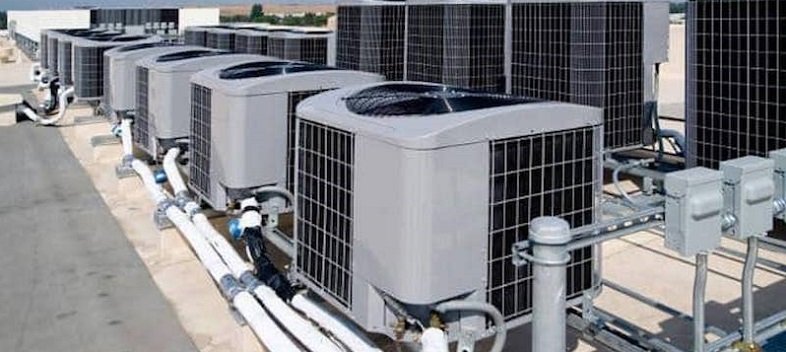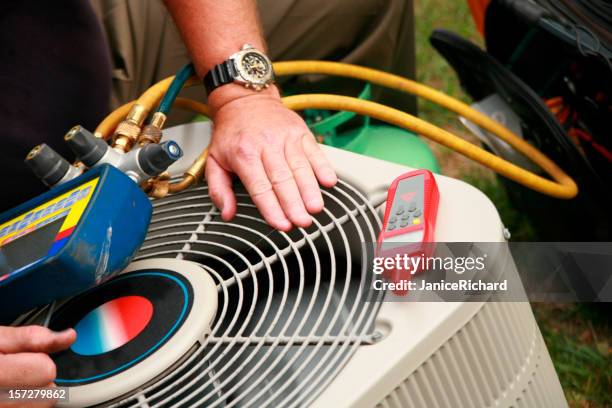Highly Rated Pros for heat pump replacement ooltewah tn
Picking Between a Warm Pump and Heater: Trick Considerations for Your HVAC Needs
When examining home heating alternatives for cooling and heating needs, the decision between a warmth pump and a heater can be complex. Each system provides distinctive advantages customized to particular climates and power efficiency objectives. Understanding these distinctions is important for making an enlightened option. Secret elements such as installment expenses and environmental effect even more complicate the option procedure. Which choice absolutely lines up with one's convenience and sustainability preferences? The adhering to sections will certainly discover these factors to consider carefully.
Recognizing Heat Pumps: How They Function and Their Advantages
While several property owners consider various home heating choices, comprehending exactly how heat pumps feature and their benefits can substantially affect their decision. Warmth pumps operate by moving heat rather than generating it. In the winter months, they draw out heat from the outside air or ground and move it indoors, while in the summer, they reverse this process, cooling down the home by getting rid of heat outside. This double capability makes them functional for year-round environment control.One of the key advantages of heatpump is their power performance. They utilize substantially much less electrical power compared to conventional furnace, potentially leading to reduced energy expenses (furnace replacement). Furthermore, heat pumps have a smaller carbon footprint, making them an eco-friendly selection. They also call for much less upkeep than standard systems, contributing to lasting cost financial savings. Generally, recognizing the auto mechanics and advantages of heatpump can help home owners make notified decisions regarding their heating and cooling needs
Discovering Heaters: Kinds, Procedure, and Advantages
Heaters are available in numerous types, consisting of gas, electric, and oil models, each with unique operational systems. Recognizing these differences is important, as they influence performance and heating performance. Furthermore, heating systems provide many advantages, such as regular warmth output and dependability in chillier environments.
Types of Heating systems
Furnace can differ significantly in style and procedure, with heaters being a popular choice among home owners. There are several sorts of heating systems, each making use of various fuel sources and modern technologies. Gas furnaces prevail, leveraging gas to create warm efficiently. Electric heating systems, on the other hand, use electric resistance to create warmth, typically favored for their simple installation. Oil heaters, while much less common, are reliable in locations with limited gas access (heat pump installation ooltewah tn). Additionally, condensing heaters maximize energy effectiveness by recording and reusing exhaust gases. Each kind runs with a system of warmth exchangers and ductwork to disperse warm air throughout a home. Recognizing the distinctions in between these furnace kinds is important for educated heating and cooling choices
Benefits of Heating systems
For home owners looking for trusted heat throughout chilly months, the advantages of heating systems are considerable. Heaters provide consistent home heating, guaranteeing also temperature levels throughout the home. They are especially effective in extreme cool, frequently surpassing heatpump in freezing conditions. Different types, including gas, electrical, and oil furnaces, offer flexibility to fulfill diverse needs and preferences.Furnaces likewise have a tendency to have reduced first setup prices compared to heat pumps, making them an extra easily accessible choice for numerous. Their durable design adds to a longer life expectancy, with several devices lasting over 15 years with proper maintenance. Furthermore, contemporary furnaces are frequently equipped with innovative technology for improved performance, which can cause reduced energy costs. Overall, heating systems continue to be a reputable selection for efficient home heating.

Energy Effectiveness: Comparing Warmth Pumps and Furnaces
When contrasting power efficiency in between heat pumps and furnaces, the Seasonal Energy Efficiency Proportion (SEER) plays an important duty in determining efficiency. Furthermore, an operational expense evaluation discloses the long-lasting monetary implications of each system. Recognizing these factors can lead home owners in making educated choices regarding their heating remedies.
Seasonal Power Efficiency Ratio
Power efficiency plays a necessary function in the decision-making process in between heatpump and furnaces, specifically when taking into consideration the Seasonal Energy Performance Proportion (SEER) This metric measures the cooling effectiveness of heat pumps over an entire cooling period, giving a standard method to review efficiency. Higher SEER scores indicate greater power performance, converting to lower power intake and minimized energy costs. In contrast, heaters are typically analyzed using the Yearly Gas Utilization Performance (AFUE) ranking, which shows home heating performance. When contrasting these 2 systems, property owners need to focus on SEER rankings for heatpump, as they straight impact total power financial savings and ecological sustainability. A detailed understanding of SEER can notably influence the long-lasting fulfillment and cost-effectiveness of the picked a/c remedy.
Operational Price Analysis
Recognizing the functional costs related to heatpump and furnaces is vital for home owners evaluating their choices. Heat pumps usually use higher energy performance, converting electric power into warm with marginal waste. This leads to lower monthly energy costs, especially in modest environments. On the other hand, typical heaters, particularly gas models, might have reduced upfront costs yet can sustain greater operational costs in time because of sustain costs and efficiency ratings.Moreover, heat pumps can operate as both heating and cooling down systems, possibly reducing the requirement for different HVAC devices. While preliminary investments for warm pumps might be greater, their lasting savings in power efficiency can make them click to read a more affordable selection for lots of families. Cautious evaluation of neighborhood power prices is vital to figure out the most effective option.
Installment Costs: What to Expect for Each Heating Unit
Installation costs for furnace can vary substantially in between heatpump and heating systems, influencing homeowners' choices. Warmth pumps usually have higher upfront installment expenses, normally ranging from $3,500 to $8,000, depending upon the unit dimension and complexity of installment. This includes the exterior unit, indoor handling system, and essential ductwork alterations. Alternatively, heaters often tend to have lower first prices, balancing in between $2,500 and $6,000, which can be appealing for budget-conscious house owners. Nonetheless, installment costs can increase if considerable ductwork is required.Moreover, the choice of gas kind for furnaces-- all-natural gas, lp, or electrical-- can additionally affect installation expenses. While heatpump use power effectiveness, their preliminary financial investment might prevent Home Page some purchasers. Ultimately, evaluating installment costs alongside long-lasting financial savings and effectiveness will help home owners in making notified decisions concerning their heating systems.
Environment Considerations: Which System Carries Out Much Better in Your Area
Exactly how do climate problems influence the efficiency of furnace? The performance of warm pumps and furnaces can differ considerably relying on the regional climate. In modest climates, warmth pumps excel by efficiently moving heat from the outside air, making them an energy-saving alternative. However, their effectiveness diminishes in extremely cool temperatures, where they might battle to remove adequate warmth. On the other hand, heating systems, particularly gas versions, give regular and dependable warmth regardless of outside conditions, making them more suitable in cooler regions.In locations that experience milder wintertimes, warm pumps can run properly year-round, supplying both heating and cooling. On the other hand, regions with harsh wintertimes typically profit from the effectiveness of heaters. Ultimately, understanding the regional environment is essential when choosing in between a warmth pump and a heater, as it straight influences their functional effectiveness and general efficiency.
Maintenance Requirements: Long-Term Look After Heat Pumps vs. Furnaces
While both heat pumps and furnaces require routine maintenance to ensure peak performance, their particular needs and treatment routines differ considerably. Heating systems typically need less regular attention, with yearly examinations being sufficient to examine for gas leakages, clean filters, and analyze total performance. Their less complex style often permits straightforward repairs.In comparison, heat pumps demand semiannual upkeep because of their dual role in cooling and heating. This consists of cleansing coils, checking refrigerant degrees, and ensuring that both the outside and interior systems operate at their finest. Furthermore, heatpump upkeep commonly entails more complex parts, making expert maintenance essential.Neglecting upkeep can bring about reduced efficiency and raised power expenses for both systems. Inevitably, homeowners ought to take into consideration these long-lasting care requirements when selecting in between a heatpump and a furnace, as proactive maintenance can expand the life expectancy and performance of either system substantially.
Environmental Influence: Selecting a Lasting Home Heating Choice
The ecological impact of furnace is a critical assessment for property owners seeking lasting choices. Heatpump are usually extra energy-efficient than typical heating systems, as they move warmth as opposed to create it, substantially reducing carbon discharges. By utilizing renewable resource resources, such as air-source or geothermal heatpump, house owners can better lessen their environmental footprint.On the other hand, gas heating systems emit greenhouse gases and add to air pollution, though they usually offer higher warmth result. Nonetheless, improvements in innovation have led to the advancement of high-efficiency heaters that minimize emissions.Ultimately, selecting a heater entails evaluating effectiveness versus environmental impact. House owners are motivated to reflect on neighborhood energy sources and see it here rewards for eco-friendly systems, guaranteeing a selection that lines up with both individual convenience and ecological responsibility. The choice impacts not just immediate comfort but also long-term sustainability and environmental wellness.
Regularly Asked Questions
The Length Of Time Do Warmth Pumps and Furnaces Commonly Last?
The life-span of heat pumps commonly ranges from 15 to two decades, while furnaces can last in between 15 to thirty years. Regular upkeep considerably affects their long life and effectiveness in supplying home heating solutions.
Can I Utilize a Heatpump in Very Cold Climates?
Heat pumps can run in extremely cold climates, however their efficiency decreases as temperatures decline. In such problems, supplemental home heating sources might be required to preserve comfortable interior temperatures and assure peak performance.

What Is the Sound Level of Heat Pumps Versus Furnaces?
The noise levels of heatpump and heaters differ significantly. Usually, heatpump run even more quietly than typical heating systems, making them preferable for those sensitive to seem, while furnaces may produce louder operational noises throughout heating cycles.
Are Heat Pumps Suitable for Both Cooling And Heating?
Warmth pumps are undoubtedly suitable for both heating & cooling (heat pump replacement ooltewah tn). They function by transferring warm, offering effective temperature level control year-round, making them a versatile choice for homeowners seeking an all-in-one a/c service
What Dimension Furnace Do I Required for My Home?
Determining the ideal size heating unit for a home needs reviewing variables such as square video footage, insulation high quality, neighborhood environment, and the home's design. Consulting a specialist can assure an exact evaluation and excellent comfort. Heat pumps typically use greater energy effectiveness, transforming electrical power into warm with marginal waste. In modest environments, warmth pumps stand out by efficiently transferring warmth from the outside air, making them an energy-saving alternative. Alternatively, heating systems, particularly gas models, offer regular and trusted warmth regardless of outdoor problems, making them better in colder regions.In areas that experience milder winters, heat pumps can operate properly year-round, offering both home heating and cooling. Heat pumps are generally a lot more energy-efficient than standard heaters, as they transfer warmth rather than generate it, greatly lowering carbon exhausts. By making use of sustainable energy sources, such as air-source or geothermal warm pumps, home owners can further reduce their ecological footprint.On the other hand, all-natural gas heaters release greenhouse gases and contribute to air pollution, though they often give greater warmth outcome.